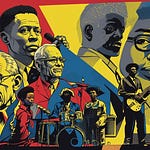Greetings, Reggaeologists!
As we navigate the ever-evolving landscape of reggae and dancehall, it's crucial to grasp the difference between two key concepts that drive an artist’s success: branding and marketing. While both play essential roles, they operate in fundamentally different ways within our vibrant industry. In this issue, we’ll explore how these elements intertwine and why mastering both is vital for achieving longevity and impact in the music business.
The Difference Between Fame & Legacy: Branding Is Your DNA
In the realms of reggae and dancehall, branding is about forging an identity that lasts a lifetime. It transcends mere logos and taglines; it’s the narrative woven through every song, performance, and public appearance.
Take Bob Marley as a prime example. His brand was built on principles of peace, unity, and Rastafarianism. Marley’s music became more than entertainment; it evolved into a voice for the oppressed, embodying a movement that resonates globally, decades after his passing. His brand wasn't created overnight; it blossomed through each album, message, and performance, cementing him as a timeless ambassador of reggae and revolution.
Similarly, Buju Banton epitomizes the evolution of branding. From his raw, gritty dancehall beginnings to his embrace of Rastafarianism, Buju’s brand matured authentically, rooted in his life experiences. This genuine shift has kept him relevant across generations.
On the flip side, Vybz Kartel, the self-proclaimed "Worl’ Boss," has crafted his brand around controversy, innovation, and street credibility. Even while imprisoned, his marketing strategies keep him in the spotlight. Yet, it’s his long-standing brand of unpredictability and rebellion that keeps fans engaged, proving that the essence of branding lies in the story and message an artist consistently embodies.
Branding takes time, dedication, and authenticity. Once established, it becomes a solid foundation that sustains an artist through their career. But it’s not just for the icons; rising stars like Lila Iké and Chronixx are also mastering this craft, staying true to their roots while reaching global audiences. They’re not chasing trends; they’re building identities that will outlast any chart.
Marketing: The Temporary Push
While branding is the long-term strategy, marketing delivers short-term boosts. It’s the engine driving specific releases—albums, singles, or tours—designed to create excitement and generate quick results like streams, sales, and ticket purchases.
But here’s where the magic happens: Marketing is the hype, but branding is the heart. Look at Sean Paul. His collaborations and marketing propelled him to global stardom, but it’s his authentic dancehall brand that solidified his place in both pop and reggae cultures. Shaggy achieved similar success with his hit It Wasn’t Me. Marketing brought him airplay, but his fun, playful brand kept him relevant.
The marketing machine can be fast and flashy, yet without the strength of branding, success can be fleeting. Marketing amplifies an artist’s presence in the short term, but a lasting career is rooted in a strong brand.
Let’s shine a light on two rising stars in reggae who are harmonizing branding and marketing brilliantly: Mortimer and Lila Iké.
- Mortimer: Known for his soulful, roots-infused sound and socially conscious lyrics, Mortimer is building a brand that reflects spiritual growth and emotional depth.
His songs weave a narrative of vulnerability and hope, making him a trusted voice among reggae's new wave. His marketing campaigns, which promote singles and EPs, reinforce this identity, ensuring fans know what to expect from him in the long run.
- Lila Iké: Crafting a strong, consistent brand, Lila blends reggae, dancehall, and soulful vocals with empowering lyrics.
Her catalog not only showcases her vocal ability but tells stories of resilience and strength. Her marketing strategies—visually striking music videos and curated social media content—always align with her authentic brand, creating a connection with her audience based on trust and relatability.
Both Mortimer and Lila Iké understand that while marketing provides the initial push, their brand will ensure long-term relevance. They exemplify how rising artists in reggae and dancehall can craft their identities while ensuring every marketing move strengthens their overall message.
The Symbiosis of Branding and Marketing
The most successful reggae and dancehall artists are those who understand how to balance branding and marketing effectively.
While marketing can spike an artist’s visibility in the short run, it needs to align with the artist’s brand to sustain that success. When marketing strategies deviate too far from an artist’s core identity, fans may feel disconnected, leading to short-lived fame.
What Can We Learn?
For aspiring reggae and dancehall artists, it’s crucial to invest in building a strong, authentic brand that resonates deeply with your audience. A well-crafted brand will withstand the test of time and keep fans loyal through various phases of your career.
Marketing should be leveraged to create short-term excitement for your releases but must always align with your brand. The fleeting success of marketing campaigns is sustainable only when the artist’s brand is strong and authentic.
Build Your Brand, Not Just Your Buzz
Rising artists, take heed: while marketing may get you streams, branding will secure your longevity. You can have a viral moment, but it’s your brand that will carve your place in reggae and dancehall history.
Focus on what makes you unique, and let your marketing efforts showcase that authenticity.
Until next time, keep your brand strong and your message powerful.
Lloyd 'Reggaeology' Laing
Music Business Analyst and Advocate for Fair Pay. Follow @Reggaeology














Share this post